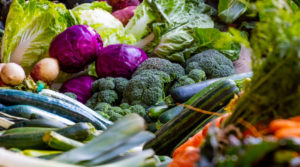VEGAN PROS AND CONS
Veganism is growing in popularity with vegans and vegetarians set to make up a quarter of the British population by 2025.
Contemplating going plant-based? Here are the pros and cons of going vegan…
WHAT ARE THE HEALTH BENEFITS?
A more varied and balanced diet
 Studies have consistently reported that well-planned vegan diets tend to be higher in dietary fibre, magnesium, potassium folate, vitamins A, C and E, and phytochemicals (beneficial plant compounds).
Studies have consistently reported that well-planned vegan diets tend to be higher in dietary fibre, magnesium, potassium folate, vitamins A, C and E, and phytochemicals (beneficial plant compounds).
Weight management
Vegan diets can be more effective at promoting weight loss than traditional dieting as they have a natural tendency to reduce your calorie intake. Several studies show that vegans tend to have lower BMIs than non-vegans.
Reduced risk
 Well-planned vegan diets generally consist of large amounts of fresh fruits, vegetables, legumes and fibre which are linked to a lower risk of heart disease.
Well-planned vegan diets generally consist of large amounts of fresh fruits, vegetables, legumes and fibre which are linked to a lower risk of heart disease.
Observational studies report vegans may benefit from up to a 75% lower risk of developing high blood pressure, and up to 42% lower risk of dying from heart disease. Vegans also tend to have lower blood sugar levels, and up to a 50–78% lower risk of developing type 2 diabetes.
Studies have also shown that regularly eating legumes, may reduce your risk of bowel cancer by about 9–18% and according to the World Health Organisation, about one-third of all cancers can be prevented by factors within our control, including diet.
ARE THERE ANY HEALTH RISKS?
Any poorly planned diet can lead to deficiencies. A poorly planned vegan diet, for example, may provide insufficient amounts of the following:
Beneficial (Omega 3) fats
Diets which exclude fish, eggs, or sea vegetables (seaweeds) tend to lack beneficial Omega 3 fats (EPA and DHA) which are important for optimal nervous system, cardiovascular, eye and joint health.
Nuts and seeds can provide EPA and DHA, however at a fairly low efficiency. Vegans can obtain the needed levels of DHA and EPA from micro-algae oil supplements, as well as from foods fortified with DHA and EPA.
Vitamin B-12
This nutrient is needed to protect nerves and produce healthy red blood cells. Vegans typically have a higher prevalence of vitamin B-12 deficiency, which can result in anaemia, fatigue, mood disturbance, memory and concentration difficulty and abnormal neurological symptoms. Lost intake can be replaced through B-12-fortified plant foods, such as fortified soy, seaweed, cereals, nutritional yeast as well as vitamin supplements.
Iron
This is important for absorbing oxygen into the blood and transporting it to the cells in the body. Although, most people on plant-based diets actually obtain more dietary iron, they usually have lower ferritin levels (a marker of how much iron is stored in the body).
This is because heme-iron (found in animal sources of protein), is absorbed in substantially higher quantities by the body than non-heme iron found in plant foods. Therefore, vegans have to eat substantially more non-heme. Dried beans and dark leafy greens are rich sources of iron and vitamin C, which improves the absorption of non-heme iron. Using a cast-iron skillet to cook is a good way to increase the iron content of food.
Calcium
This mineral is crucial for bone health and skeletal development. Eating more tofu, tahini, almonds and green, leafy vegetables can help to top up calcium levels.
Zinc
Deficiency of this mineral can lead to hair loss, poor healing, immunological problems, skin problems and reproductive hormone imbalance. Vegans are often considered to be at risk for zinc deficiency due to the high phytate content of a typical vegan diet. Phytates – a common component of grains, seeds, and legumes, bind zinc and decrease its availability for absorption by the body. Nuts and seeds are excellent sources of zinc, some of the best being pumpkin seeds, sunflower seeds, walnuts, cashews, almonds, pecans, chia seeds, and hemp seeds.
Protein
All of our body’s tissues and organs require protein for general maintenance, and for making new cells. When we eat proteins, they are broken down into individual amino acids to be rebuilt and form the exact protein we need.
Essential amino acids (EAAs) cannot be produced by the body and can only be found from dietary sources. All animal-based proteins are complete sources of protein as they contain all of the EAAs required by the body. EAAs are not all present in any single plant-based food. Therefore, it is important to introduce (or increase) the intake of a range of vegan foods to make sure all EAAs are covered to maintain optimal health and functioning.
HOW DO I KNOW IF I HAVE ANY NUTRITIONAL DEFICIENCIES?
Whatever diet you follow, annual blood tests are a good way of confirming optimal internal organ function and screening for nutrient deficiencies and are easily accessible through your GP.

ABOUT THE AUTHOR
Dr Daniel Fenton MBBS DFSRH DRCOG MRCGP is the Clinical Director at the walk-in GP clinic of the London Doctors Clinic. See: londondoctorsclinic.co.uk/services/well-person-medical-health-screens/

